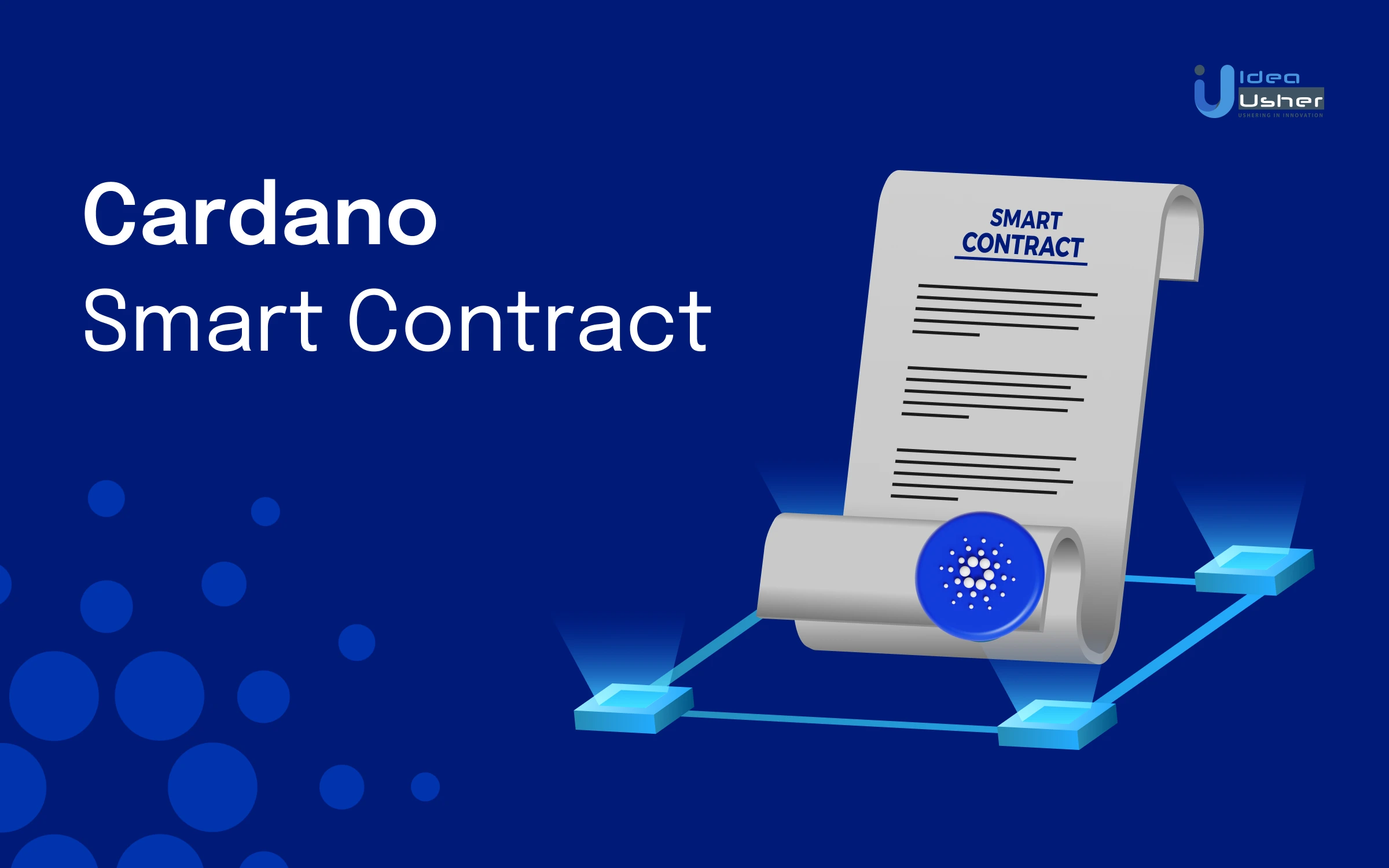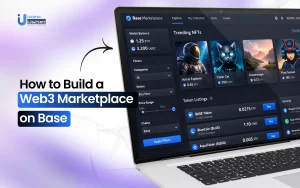It’s a fine moment to explore the investment potential in crypto, and crypto-based platforms as cryptocurrencies are expanding spectacularly, with over 20,268 now in circulation. Among all the available platforms, cardano smart contracts have earned themselves a reputation in the cutthroat world of cryptocurrencies and will be a hit with C-level executives. However, it is crucial to learn smart contracts and comprehend the fundamentals of cardano while talking about how they work, and how to create one. Let’s plunge in and uncover more.
| Cardano Rank | Seventh-largest cryptocurrency |
| Cardano in circulation | 33,752,565,071 ADA |
| Market worth | $17bn |
| 1 ADA | 0.26 USD |
| Cardano price as of Jan 2023 | $0.2641 |
What are cardano smart contracts?
Blockchain 1.0 has given way to Blockchain 3.0, and cardano is one of the most advantageous contenders to watch. The third generation of Blockchain offers unique advantages and eliminates the problems with governance, sustainability, and scalability.
Cardano is a decentralized public blockchain platform with a smart contract. It is an open-source platform that offers support for DApps. Cardano is a blockchain designed to outperform Bitcoin and Ethereum in terms of interoperability, scalability, and sustainability. Interestingly, cardano is often referred to as an Ethereum killer.
A proof of stake (PoS) consensus mechanism is used by cardano, making it a more resilient and scalable blockchain. It stands out among the future generation of cryptocurrency solutions owing to its consensus method, which employs a special multilayer design and mathematical concepts.
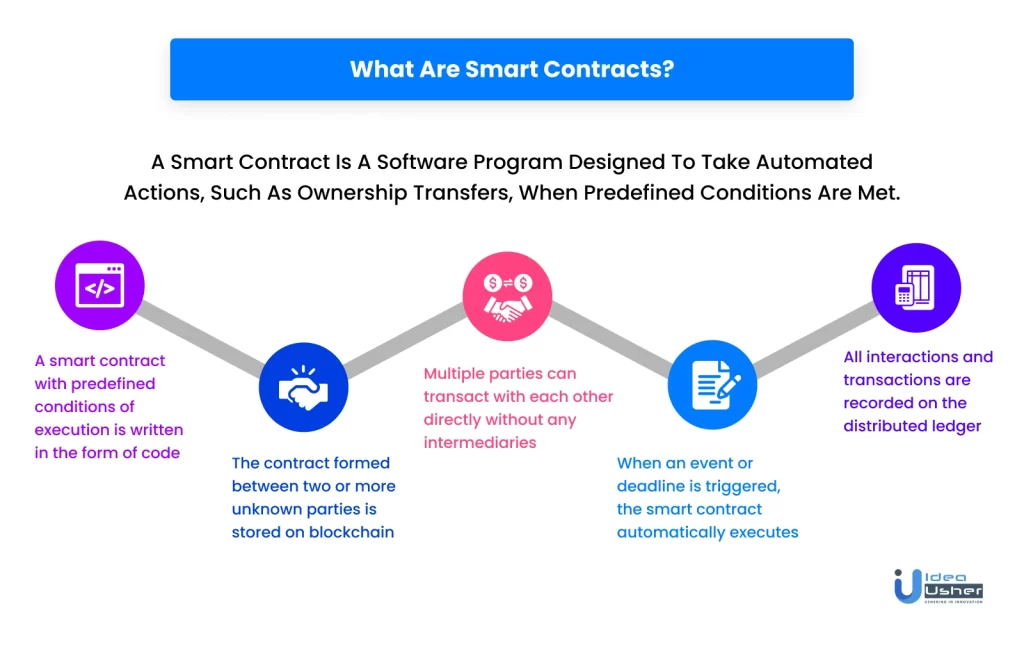
Overview of ADA smart contracts
- It is quite similar to the Ethereum blockchain.
- On the cardano blockchain, the ADA smart contracts function like executable programs.
- One of the three languages—Plutus, Marlowe, or Glow—can be used to create the ADA smart contracts.
- The cardano blockchain has a number of advantages:
- Since no intermediaries are involved, the integration of smart contracts speeds up the process.
- The decentralized network on which the smart contracts are hosted prevents the meddling of data.
- The data and backups kept on a decentralized network are permanently archived.
- Decentralized applications, systems, and communities benefit from their unmatched security and sustainability.
- It provides a clear and long-lasting framework on which people can interact, systems can function, and businesses can expand.
Cardano brings a new standard in technology – open and inclusive – to challenge the old and activate a new age of sustainable, globally-distributed innovation.
cardano.org
How to create cardano smart contracts?
There are eight steps involved in the development of the ADA smart contracts, and that include the following:
1. Pay
A payment agreement moves a certain token value from one account in the contract to another. Even if there are positive balances of other tokens in the account, warnings are automatically generated if the value is negative or if there is insufficient money to make the payment in full. Then, a portion of the payment is paid (of all available funds). Additionally, “an edit” is made to the contract, and the term cont in the contract designates the continuation contract.
2. Close
The Close stage aids in determining how the contracts will be managed or terminated. Its main purpose is to pay account holders who have a positive balance back. Each account must go through this procedure again, but it only takes one transaction to pay back all the accounts. The course of action will be based on the actions, values, and observations that are defined.
3. Observations, Values, and Actions
Values are the numerical quantities that change throughout time. Volatile values include things like the amount of a certain token in a given account, the current slot number, and any decisions that have already been made. Additionally, values may be combined using addition, negation, subtraction, and conditional on an observation.
Boolean values, known as observations, are acquired through value comparison. By employing standard Boolean operations, they might be combined. One may also check the Boolean values to see if a decision has been made or not.
These findings are extremely valuable at every level of implementation. However, throughout the execution process, events normally take place at particular moments. Some possible actions are:
- Deposit of money
- Choosing an option from a wide range, such as an Oracle value
- Suggestion for some external value
4. Oracles
Oracles are being developed for the entire cardano blockchain, and users in Marlowe on cardano will have access to them. The judgments made by a participant in an exclusive Oracle position known as “Kraken” are modeled as Oracles.
The playground simulation will pre-fill a choice with the current value of the direct ADA/USD conversion rate based on data from Cryptowatch if a contract’s role is “Kraken” and that role makes an option like “dir-adausd.” By substituting the prefix inv- for the prefix inv-, it is also feasible to obtain the inverse rates for the currency combinations indicated.
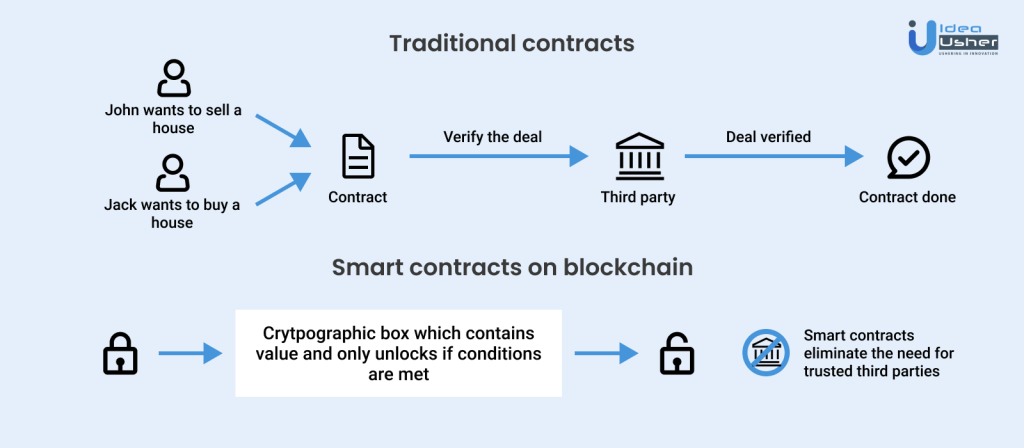
5. If
If the conditional is true, the execution of obs cont1 cont2 will proceed as cont1 or cont2, depending on the observation’s Boolean value.
6. When
This is the most difficult contract function Object() {[native code]} with the form When cases timeout cont. It is a contract that is activated by actions that might or could not take place at any particular time; the cases in the contract describe what happens in specific situations.
As per the contract, a group of instances is added to the list of cases When cases timeout cont. Every case is in the format Case ac co, where ac stands for an action and co for a continuation. The state changes, and the contract continues as the proper continuation co when a certain action, like ac, takes place.
As soon as the timeout and the slot number are reached, the timeout contingency will stay in effect, guaranteeing that the deal is closed.
7. Let
With the help of the Let id Val Cont function, ADA smart contract may provide a value for an identifier in a lease agreement. The contract is extended as the cont, while the values specified in the expression are then evaluated and saved with the name ID.
The method aids developers in the usage of acronyms as well as the capturing of data that is prone to change throughout the development process.
8. Assert
A contract that states Assert obs cont proceeds as usual without changing the state of the contract; however, it issues a warning if the observation obs is false. Due to the fact that the static analysis would fail if any execution results in a false assert, it may be used to ensure that a property holds at any point in the contract.
In short, at this point, the property still holds as the static analysis throughout the smart contract, but it is vulnerable to failure in a false assert.
What programming languages does cardano use for its smart contract development?
As listed below, there are three distinct languages for developing smart contracts on the cardano platform.
1. Marlowe
Users may build blockchain apps particularly geared at financial transactions using the domain-specific language (DSL) Marlowe. The Marlowe DSL offers certain advantages over a Turing-complete language:
- Greater Safety
- Assurance of Certainty
- Assurance of termination
- Better assurance of behavior correctness
Marlowe’s design ensures the following qualities:
- Contracts have a set time limit and don’t repeat or loop.
- All agreements are subject to termination, and a timeout applies to all activities.
- Contracts are valid for a predetermined period of time.
- At closure, no assets are retained.
- Maintaining value
2. Plutus
It is a smart contract platform used in the cardano blockchain. It facilitates the development of applications that interact with the cardano blockchain. With Plutus, a single library may be used for all Haskell programming. In the most predictable, deterministic environment conceivable, Plutus makes it possible to create secure apps, acquire new assets, and create smart contracts. Furthermore, it is not necessary for developers to test their work on a whole cardano node. With Plutus, one may accomplish the following:
- Assistance with basic multi-signature scripts
- Make new tokens in a simple setting.
- Build smart contracts
3. Haskell
Haskell is the primary language for Plutus and also regulates Marlowe. It is a programming language that cardano uses to build its smart contracts. Haskell effectively produces high-assurance codes that need the right amount of formal verification. The increased level of assurance that this language offers enables the cardano developers to make sure that the implemented code is reliable and accurate.
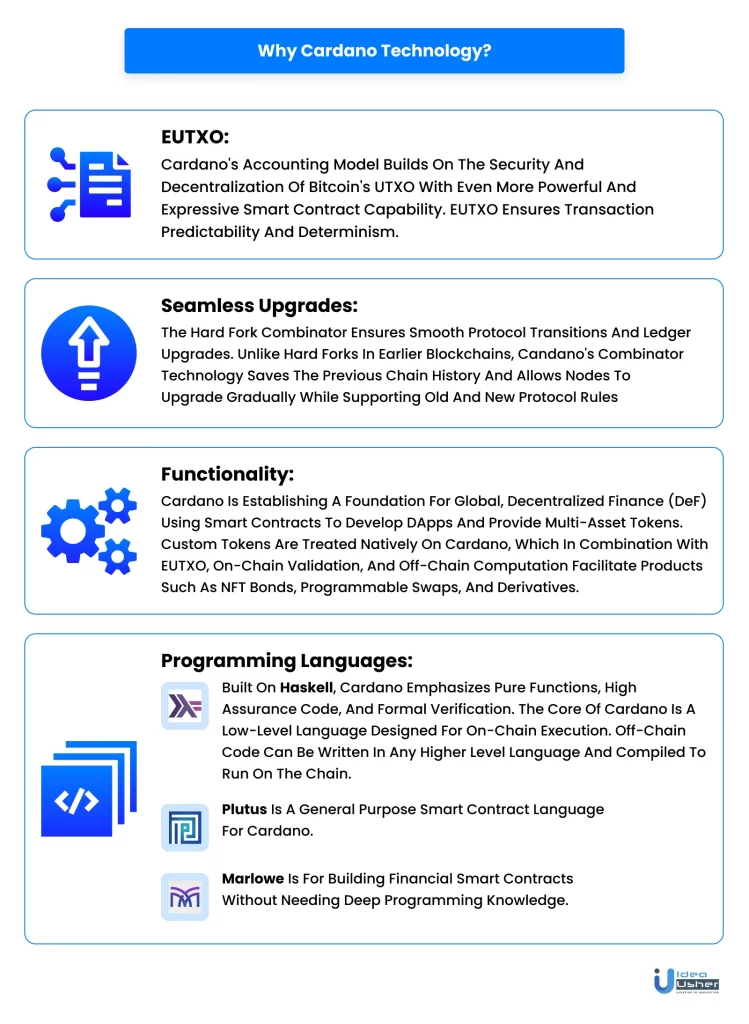
What differentiates the cardano blockchain from others?
Cardano differs from other blockchain protocol technologies in a variety of ways. Cardano was created to be resilient, compatible, and scalable with different system architectures and blockchains. Development of the cardano protocol is based on the following:
- The development of protocol using Haskell as a functional language
- Peer-reviewed research
- High-assurance code
Cardano has the backing of academics and is developing its community based on research. It has funding for development and a capable team. Cardano has a lot of credibility that most other coins lack since the mechanism is open to peer review.
Compared to ethereum or Bitcoin, cardano has a substantially lower transaction fee. Moreover, cardano operates a blockchain that uses less energy.
The scalability of the cardano blockchain is higher. Cardano makes sure that it can expand to any scale and that transactions happen swiftly by employing a computational layer and a settlement layer. Additionally, it enables changes to be done without having an impact on payments or other transactions.
Developing smart contracts in any other smart contract language will not be as safe or reliable as writing them on the cardano platform. Due to peer review and high assurance, the smart contract code for cardano is secure, tested, and documented.
On the cardano blockchain, a smart contract established and implemented in Plutus offers total transparency to all parties involved. When designed properly, a single hostile actor is incapable of engaging.
The future strength of cardano depends on its ability to function as a reliable and binding entity for the transfer of shareholder assets.
Why is cardano better than ethereum?
The foundation of cardano use cases is that it aims to be better than Ethereum merge.
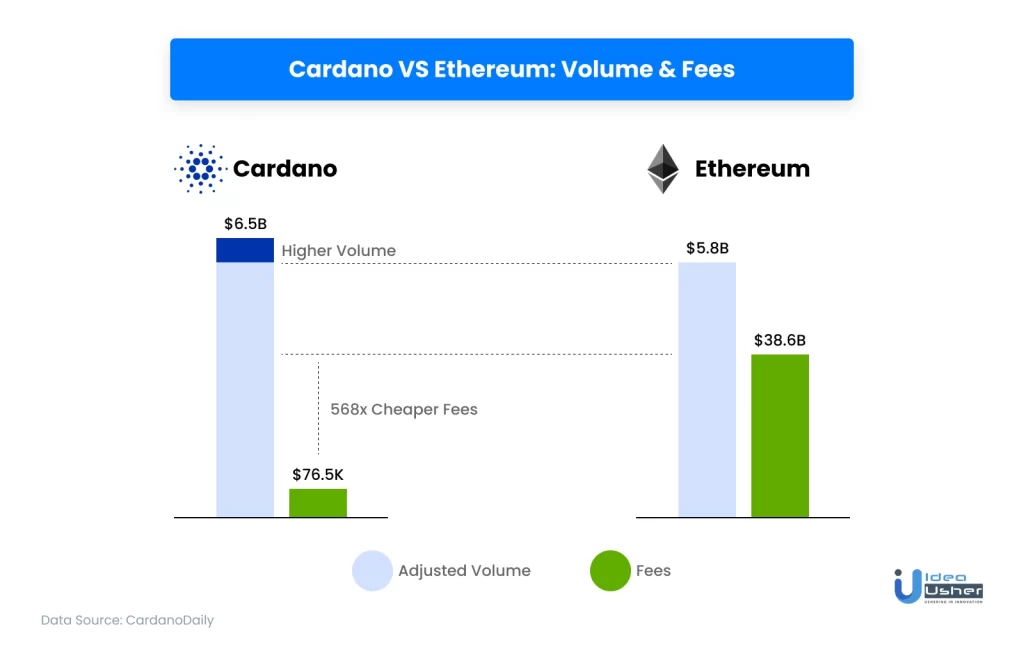
1. Consensus
The cardano blockchain uses the Ouroboros proof-of-stake consensus algorithm to determine how new transactions will be approved and added to the blockchain. Instead of mining tokens, in this case, users stake the native token as part of a block-validation process, making blockchain more cost-effective, energy-efficient, and scalable.
2. Approach
Unlike other blockchain systems, before releasing any new updates, products, or services, cardano follows a rigorous peer-reviewed scientific procedure. This offers the cardano developers the assurance that their smart contracts will be supported by documentation and industry-wide validation from other computer scientists and developers when they are built on the platform.
3. Architecture
The network is separated into two layers: CCL (Cardano Computation Layer), which is used to create ADA smart contracts, and CSL (Cardano Settlement Layer), which is used for ADA transfers. Running operations on both tiers is more effective because of this distinct division of tasks. Ethereum, on the other hand, handled both smart contract and ETH transactions on the same layer, resulting in greater costs and congestion.
Why should you choose cardano as a platform for smart contract development?
With the development of ADA smart contracts, there are several advantages, such as:
- An organization using blockchain technology can benefit from top-notch network security attributable to the 70% of ADA that is invested.
- Contracts may now be created using the Marlowe programming language rather than any general-purpose language. The Marlowe contracts are incredibly simple to write, read, and comprehend.
- The protocol and transactional processing throughput were increased by the Vasil hard fork, which went live in July 2022, increasing the usefulness of the smart contracts.
- Last but not least, because of features like rapid transaction times and reasonable fees, cardano is a good option for developing smart contracts.
Cardano smart contracts use cases
1. Mortgage
Faster debt processing is made possible by a mortgage system based on ADA smart contracts, which excel at self-executing financial transactions. Furthermore, it may immediately highlight any flaws in debt instruments. This smart contract may assist in improving automation, making the real estate process simple for buyers and sellers, enhancing productivity, and lowering the cost of obtaining a mortgage. To make it simple to execute automatically, the ADA smart contracts must be built for this purpose in accordance with the mortgage agreements.
2. Gaming
Blockchain smart contracts have caused a profound upheaval in the gaming industry. The benefit is that the lengthy physical paperwork procedures are no longer necessary for players to join an eSports team. By enhancing business models’ equity, transparency, and digital persistence, cardano has changed the gaming industry’s architectural framework. Cardano can give more customized gaming solutions as it develops, boosting interest and bringing in more money. The ADA smart contracts are designed to store data on how many competitions have been won, game scores, and more. Additionally, when certain requirements are satisfied, the rewards are created automatically.
3. Supply chain tracking
The ability of cardano to create smart contracts is quickly gaining popularity in business ecosystems. One of the world’s largest producers of sports footwear and clothing, New Balance, has implemented ADA smart contracts to employ blockchain tools to track the authenticity of its footwear throughout its supply chain. Buyers can verify footwear’s authenticity on the distributed ledger using the consumer-level verification method.
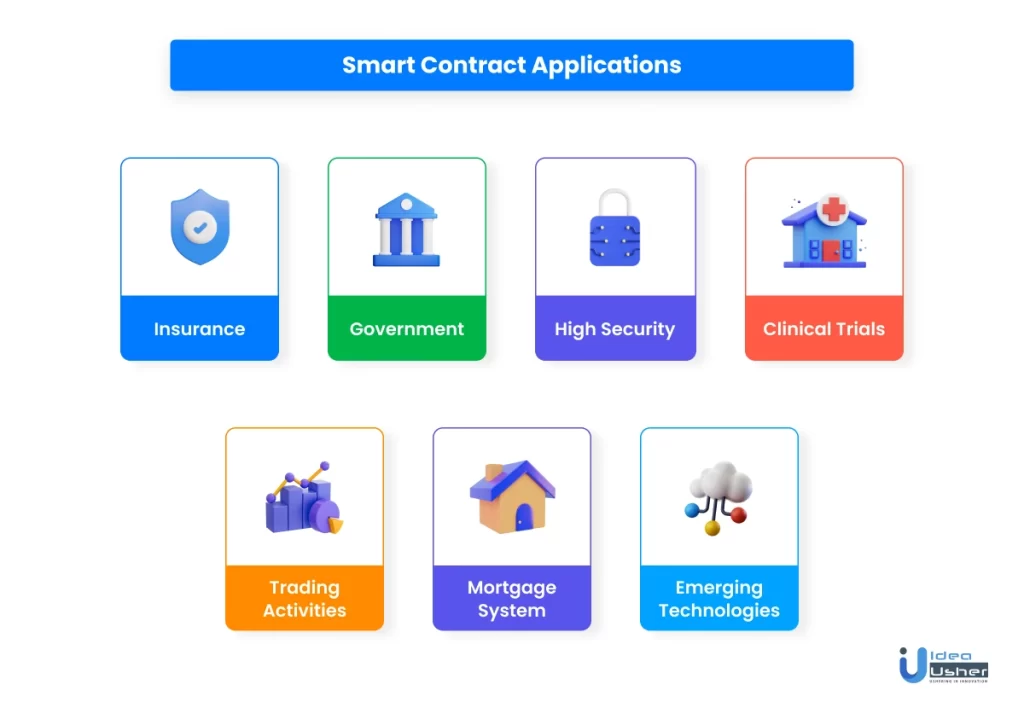
4. Legal
ADA smart contracts have several applications in the legal sector, including but not limited to intellectual property rights, land registration, litigation, a chain of custody, financial transactions, and settlements. Blockchain allows for the automated execution of legal contracts, speeding up the process execution. Furthermore, smart contacts offer 100 percent security.
5. Verification of creds and identify
Three products—Atala Prism, Atala Scan, and Atala Trace—have been created by cardano. These products support identification and credentials verification.
- Atala Prism is an identity management tool that grants access to particular services.
- Atala Scan and Atala Trace assist in tracking a product’s progress through a supply chain.
Cardano is also assisting a university in verifying credentials more quickly and affordably than the existing method with this use case of the ADA smart contracts.
6. Cross-border payments
Through LoC (Letter of Credit), Cardano-based smart contracts facilitate the movement of products and the commencement of payments across borders. It improves the financial assets’ liquidity and increases the financial effectiveness of all stakeholders.
More use cases of cardano
- Enables doctors to quickly access medical records.
- Aids agricultural sectors in inspecting a commodity’s whole supply chain.
- Provides instant access to and irrevocable academic certifications.
- Aids environmental charities in tracking the precise results of a donation.
Develop a cardano smart contract with Idea Usher.
Contracts have the power to impact our financial situation significantly. Cardano smart contracts will offer a very efficient digital environment for simulating and carrying out actual contracts. There are several opportunities, and you must carefully consider developing sustainable solutions. Get in touch with Idea Usher if you want to create reliable blockchain solutions but need help figuring out where to begin. We are a top-notch web and mobile app development firm with significant experience in assisting businesses in developing successful digital solutions.
Let’s talk.
Build Better Solutions With Idea Usher
Professionals
Projects
Contact Idea Usher at [email protected]
Or reach out at: (+1)732 962 4560, (+91)859 140 7140
FAQ
Q. How do smart contracts in cardano work?
ADA smart contracts perform duties comparable to those of ETH contracts. They function as virtual agreements between two or more parties and take effect once the necessary criteria are met.
Q. Can cardano be used to create smart contracts?
Cardano supports the development of smart contracts. On the cardano blockchain, smart contracts may be programmed using the languages Plutus, Marlowe, and Glow. Plutus, however, needs prior programming experience in Haskell.
Q. How can an NFT marketplace be created using cardano?
Cardano’s cutting-edge technology and integrations can aid in the growth of the NFT Marketplace. It includes exceptional features and capabilities and a customer-centric strategy to assist in developing a user-friendly platform controlling frictionless transactions and NFT generation.


